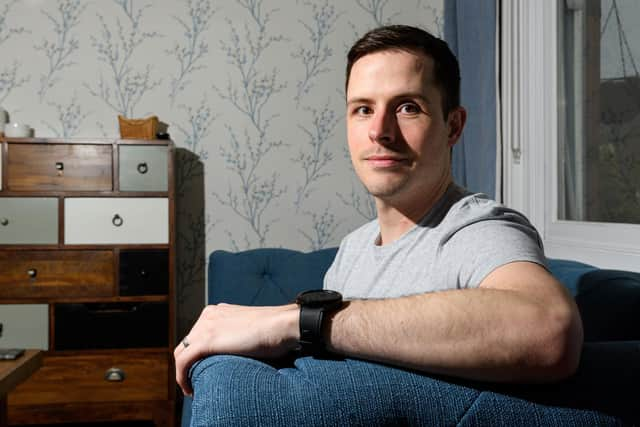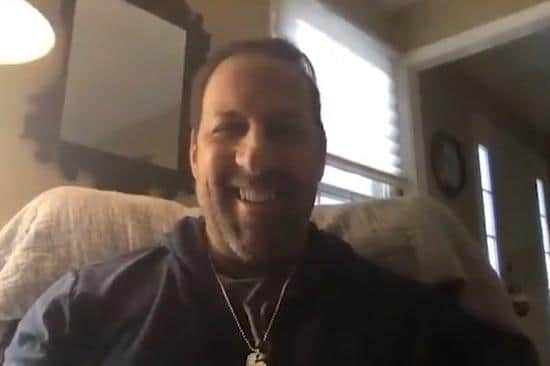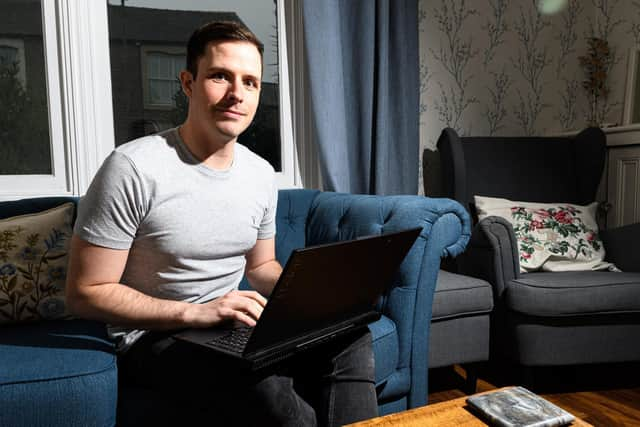How a man from Chorley saved a man's life in America in a million-to-one chance, without even meeting him
and live on Freeview channel 276
Fifty-six-year-old Patrick Languzzi from Massachusetts broke down in tears when he saw Alex Christopher for the first time via Zoom, declaring "I love you like a brother".
Their virtual meeting earlier this month, came three years after a stem cell donation from Alex helped Patrick recover from a rare blood cancer with only a three per cent chance of survival.
Advertisement
Hide AdAdvertisement
Hide AdNow they are both working to spread the message about donations on either side of the Atlantic- and to dispel outdated beliefs that the process is difficult and painful.


Alex, who is originally from Morecambe, said: "It's so life-affirming, it makes you think there's a reason to you being here. It gives you a much bigger sense of purpose and feeling of self-worth. Not everybody can say they've saved someone's life."
Alex, a married father-of-one, decided to join the DKMS register after workmate Peter McCleave discovered he has blood cancer myeloma, and only a few years to live if a donor is not found.
>>>Peter still needs to find a donor. Click here to find out more.
Advertisement
Hide AdAdvertisement
Hide AdUnfortunately, Alex wasn't a match for his friend, but a series of simple and painless swab and blood tests revealed he was a perfect match for Patrick, a former pro Mr Universe finalist and actor.


The former University of Central Lancashire marketing student said: "I'm told a good match is 70 per cent, and to be a 100 per cent match is a million to one - he's literally my genetic twin.
"He had two other matches that were 50 per cent, so all the pressure was on me!" he laughed.
The process
Alex, who works for the investment arm of the Natwest, travelled to a private clinic in London for further health checks to rule out any underlying health conditions which might have put either Patrick or Alex at risk from the procedure.


Advertisement
Hide AdAdvertisement
Hide AdAfter this, he was able to give the stem cell donations, collected in a bag similar to blood donations.
Alex is keen to stress that the process for donating stem cells has moved on "massively" from what many people imagine.
He did not have to undergo any painful or invasive procedures - his stem cells were extracted from blood taken intravenously, then the blood was returned to him. The process took 3 hours and 45 minutes.
The day previously, he'd been injected with hormones to produce surplus amounts of stem cells so that his own health wouldn't be affected.
Advertisement
Hide AdAdvertisement
Hide AdThe former Lancaster Royal Grammar School pupil said: "It was a needle in my arm, and I really didn't notice it after a while.
"The most inconvenient thing was that I had a really itchy nose that day and I had to ask my wife to scratch my nose for me."
Staying in touch
After the procedure, Alex agreed to receive an update via letter six months later.
He said: "When it arrived, the letter was very basic, it said thank you and that your recipient is alive. But I nearly collapsed in the hallway when I got it, it really hit me."
Advertisement
Hide AdAdvertisement
Hide AdHe added: "I suppose I was nervous to open the letter, in case it said he had died. I don't know how I would have taken it, would I have felt responsible, that I hadn't done enough?"
He then got a similar update after one year, and after two years was able to share details with the recipient.
Alex said: "I got his details quite soon, but I didn't get in touch with him at that point because I didn't know how traumatic it might be for him. I waited for him to make the first move, and that was just before Christmas."
The men began speaking via email and on Facebook Messenger in December, but decided not to speak on Zoom until earlier this month.
"Seeing him brought it all home really", said Alex.
Advertisement
Hide AdAdvertisement
Hide Ad"I think I was a bit robotic on the call, it was a lot. He's been through so much, his life's changed massively, but mine hasn't really through doing this, so my brain can't really tally it all up.
"The magnitude of the impact it's had, versus how easy it was to do is strange."
The recipient
Patrick, who is married with a 19-year-old son, said: "I was in hospital prepping for a transplant when I found out a had a perfect match. I was told I had several 50 per cent matches but only one perfect match. They told me they needed to reach out to my donor first to make sure they still wanted to go through with it.
"That was overwhelming, I got a pit in my stomach when they told me they needed to double check and make sure he still wanted to donate."
Advertisement
Hide AdAdvertisement
Hide AdAfter Alex confirmed, and the donation was sent to America, administration was via a slow IV-infusion, something Patrick says was a "really easy process".
It takes months for the new donor cells to take over, and it took more than a year for Patrick to get back to a semi-normal lifestyle, but he is now amazing doctors by getting back into the gym.
Patrick admits to being overwhelmed with emotion when he saw Alex on his computer screen. He said: "Meeting Alex was a bit overwhelming at first, I became emotional once we got talking."
He added: "I look at him as a brother now. I'm grateful and I love him for what he did. Alex was my only 100 per cent match in the world, out of the 10 million plus donor registrants. Had he chosen not to donate, my outcome may have been quite different.
Advertisement
Hide AdAdvertisement
Hide Ad"I would just try and encourage people to donate, you have no idea the impact one person can have on another's life."
Alex is still on the DKMS register and is available should Patrick need a top-up, or if he is matched with someone else.
"That would be amazing", he said. "I'd definitely do it again.
"It's a very simple process and the more people sign up, the more lives we can save. Everybody can potentially save someone's life through this."
Patrick is also in the process of setting up a donor drive site through DKMS in the States to drive up donations., as well as a PR campaign.
To find out more about becoming a donor, click here.